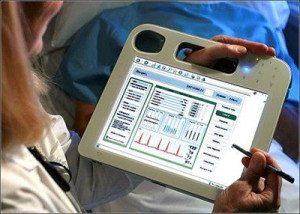
You may be asking what health informatics is if you have never heard the term before. Simply put, health informatics combines information technology (IT) and healthcare in order to provide a better standard of patient care. As more federal funding is granted to hospitals and clinics that adopt Electronic Health Records (EHR), the need for health informatics will grow. A person who works in this field is usually referred to as a health information technician.
What Do Health Information Technicians Do?
Health information technicians manage patient care records for medical facilities and make sure that they are processed and stored safely. They are often trained in medical coding, which helps to organize medical records. Technicians also use specialized software to compile patient care data onto a common server. In addition to their IT work, they must also be familiar with medical terminology, anatomy and physiology, basic statistic and medical ethics. These are subjects that are covered in their specialized training.
They may work for large hospitals or regular private clinics. Some technicians specialize in coding for certain medical conditions such as cancer. While they do not work directly with patients, health information technicians often work closely with doctors, surgeons and other physicians. For example, the technicians may need to clarify a certain patient diagnosis, or they may want to check that their patient records are accurate before they are entered into a database. Finally, healthcare information technicians also work with the billing departments of insurance companies in order to provide a quick and easy reimbursement process for patients and doctors alike. This will become even more important in the near future.
Related Resource: Master’s Health Informatics Degrees
Why is Health Informatics So Important?
As the Baby Boomer generation begins to retire, the demand for health services will increase, as will the number of health insurance claims made by senior citizens. The amount and the size of patient care records will also rise, which means that it is now more important than ever that health information is digitized and securely stored by certified professionals. According to the Bureau of Labor Statistics, the demand for health information technicians is expected to increase by 22 percent from 2012 to 2022.
Making sure that data is properly organized and stored for future use is not only benefit to a patient or their insurance company. Anonymous data gleaned from these records can help public health officials make predictions about long-term trends for various diseases. Instead of amassing hundreds of thousands of paper records, physicians and researchers will be able to access electronic records
On the individual level, healthcare informatics can give doctors a streamlined history of a patient’s care and health issues.
Health Informatics: a View to the Future
Information technology is no longer restricted just to the world of computers, programming and tech support. The healthcare industry has greatly benefited from the development of electronic records. Health informatics is a quickly growing field with many opportunities for job growth and development.
Related:
15 Best Master’s in Nursing and Healthcare Informatics
25 Online Master’s in Nursing and Healthcare Informatics
10 Most Affordable Online Master’s in Nursing and Healthcare Informatics
10 Fastest Online Master’s in Nursing and Healthcare Informatics